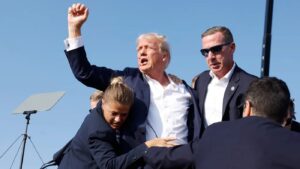ButSpeak.com
News which Matters.

The Secret Service acknowledges denying requests for additional federal resources sought by former President Trump’s security detail in the two years leading up to his attempted assassination last week, contradicting earlier statements.
In a surprising turn of events, the Secret Service has admitted that it denied requests for additional federal resources for former President Donald J. Trump’s security detail over the past two years. This acknowledgment comes after the agency initially denied turning down any such requests, especially following the recent assassination attempt on Trump.
Last weekend, a gunman opened fire on Trump from a nearby warehouse roof while he was speaking at a rally in Butler, Pennsylvania. In the wake of the incident, the Secret Service faced criticism from Republicans and anonymous law enforcement officials, who accused the agency of refusing requests for additional agents to secure Trump’s rallies.
Anthony Guglielmi, a spokesman for the Secret Service, had previously refuted these claims. “There’s an untrue assertion that a member of the former president’s team requested additional resources and that those were rebuffed,” Guglielmi said last Sunday, the day after the attack. Alejandro N. Mayorkas, the Secretary of the Department of Homeland Security, which oversees the Secret Service, echoed this sentiment, calling the accusations “a baseless and irresponsible statement and it is one that is unequivocally false.”
However, on Saturday, Guglielmi reversed his statement, acknowledging that the Secret Service had indeed turned down some requests for additional federal security assets for Trump’s detail. Two individuals familiar with the matter, speaking on condition of anonymity, confirmed that the Trump campaign had been seeking extra resources for most of the time since Trump left office. These denied requests, however, were not specifically for the Butler rally.
Prior to the Butler rally, U.S. officials had indicated that the Secret Service enhanced security measures for Trump due to intelligence suggesting a potential Iranian assassination plot against him. Despite these precautions, the agency’s admission that it previously denied other requests for increased security raises questions about the overall protection protocols for former presidents.
The assassination attempt and the subsequent acknowledgment by the Secret Service have intensified scrutiny on the measures in place to protect former leaders. The Trump campaign’s requests for additional security over the past two years highlight the ongoing need for robust protection for high-profile figures, especially those who remain active in public life.
This revelation has sparked a broader debate about the adequacy of security arrangements for former presidents. The incident in Butler underscores the complexities and challenges involved in safeguarding individuals who continue to engage in high-stakes public and political activities. The Secret Service’s admission of turning down previous requests for additional resources marks a significant development in understanding the security dynamics surrounding former presidents.
The agency’s handling of security requests and its ability to respond to evolving threats is now under the spotlight. As the investigation into the assassination attempt continues, the Secret Service’s protocols and decision-making processes are likely to face increased examination.